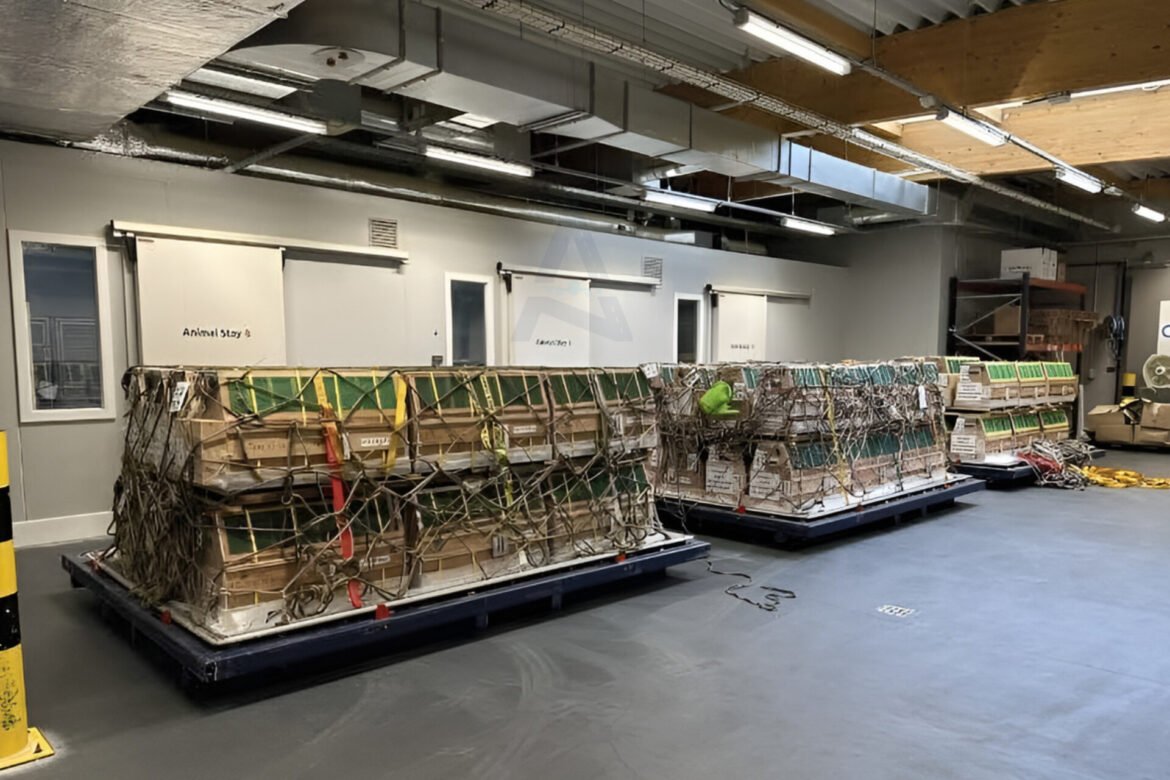Animal rights group PETA (People for the Ethical Treatment of Animals) has called for a full investigation after an endangered monkey was found dead in an air cargo shipment in Brussels, which was scheduled to be sent to the United States. The tragic incident has raised serious concerns about the treatment of animals being transported internationally and the safety protocols involved in such shipments.
The monkey, identified as a species of endangered primate, was reportedly discovered lifeless in the cargo hold of an airplane after it had been packed for transport from Brussels to a facility in the U.S. According to reports, the animal had been enclosed in a small crate designed for international shipping. PETA has expressed outrage at the conditions in which the animal was transported, stressing that these species are particularly vulnerable during long-haul flights due to the stress, confinement, and lack of adequate care.
The incident occurred at a time when international animal rights advocates are increasingly calling for stricter regulations surrounding the transport of wild animals. For years, PETA and other animal welfare organizations have pushed for an end to the practice of shipping primates, big cats, and other endangered species for entertainment, research, and private collections. These animals are often subjected to harsh, inhumane conditions during transit, which can result in injury or death.
PETA has demanded that authorities launch a thorough investigation into how the monkey was handled during the shipment and why the animal’s death was not prevented. The group is calling for a review of the cargo shipping company’s practices, particularly regarding the treatment of live animals, and is urging for tighter restrictions on the transportation of endangered species. Furthermore, PETA has urged governments and wildlife agencies to reconsider the legality of importing and exporting such species for non-conservation purposes.
The transport of animals across international borders is a highly controversial issue, particularly when it involves endangered or threatened species. In this case, the monkey was reportedly en route to a private facility in the U.S., where it was to be kept for research or potentially for public display. Many animal rights activists have argued that such practices prioritize human interests over the well-being of the animals involved, contributing to the continued exploitation of vulnerable species.
This tragic incident in Brussels has prompted a wave of condemnation from animal rights groups worldwide. Several wildlife conservation organizations have expressed concern over the growing trend of sending endangered animals abroad for commercial purposes, warning that such shipments could contribute to the further decline of already at-risk species. While some argue that regulated shipping practices could mitigate the risks associated with transporting animals, others maintain that the only way to protect endangered species is to halt these practices entirely.
In addition to its call for a full investigation, PETA is using the incident as an opportunity to raise awareness about the broader issue of animal trafficking and the global trade in exotic animals. According to PETA, the international trade in wildlife is worth billions of dollars annually, with many animals being transported under questionable conditions to meet demand from zoos, private collectors, and laboratories. The group is urging governments to work together to strengthen international laws to prevent the exploitation of endangered species and to promote more ethical alternatives for animal research and entertainment.
The tragic death of this endangered monkey serves as a stark reminder of the potential dangers of shipping live animals across the world for commercial purposes. While some argue that the transportation of animals can be done humanely with the right precautions in place, PETA and other animal rights organizations continue to advocate for an end to the practice entirely. The incident has sparked a wider debate about the ethical considerations surrounding animal transport, with many calling for greater accountability and reform in the industry to protect vulnerable species.
In conclusion, the death of an endangered monkey in an air cargo shipment in Brussels has sparked outrage and calls for an investigation into the conditions of animal transport. PETA, along with other animal rights organizations, is pushing for stricter regulations and a reevaluation of the legality of shipping endangered species for commercial purposes. The tragic event underscores the importance of ensuring the welfare of animals involved in such shipments and raises important ethical questions about the treatment of wildlife in the global marketplace.

